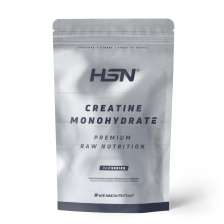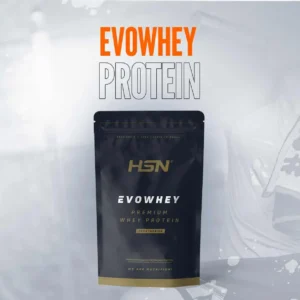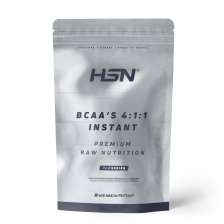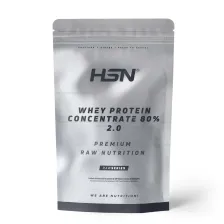Description
CREATINE MONOHYDRATE POWDER
- 100% pure creatine monohydrate powder. No additives, no flavours; just creatine.
- Available in 150g, 500g, and 1kg formats. Adjust your purchase to your needs.
- Maximum purity guaranteed, free from contaminants. Free from DCD and DHT.
- 200 Mesh – Smaller particle size for easier and longer-lasting suspension in mixtures.
- Ideal for taking alone or with other products in ‘home-made’ combinations. Easy to complement.
- Creatine Monohydrate is the most scientifically researched ergogenic* aid.
Creatine Monohydrate Powder – The Undisputed #1
Creatine Monohydrate Powder from Raw Series is a food supplement in powder form, made exclusively from raw material selected by HSN for its highest quality, of pure Creatine Monohydrate powder of 200 mesh.
Creatine monohydrate is considered the reference food supplement for sports applications, far removed from any other compound that could be considered high-level like caffeine. We have thousands of high-quality methodological scientific studies conducted over more than 3 decades supporting the safe and effective use of this compound.
HSN’s creatine monohydrate powder is the highest representation of high quality at a fair price in the HSN catalogue. Packaged in formats for personal use, only with certified raw material, without any additives or processing beyond the packaging itself.
Discover HSN’s creatine – Guaranteed effectiveness
100% pure raw material, no additives
When it comes to creatine monohydrate, which is an already quite affordable compound, there’s no need to ruin it with additives that do nothing but ‘cut’ the product, reducing the content of the compound that athletes or people wanting to use creatine are interested in; very few people want mixed creatine, and when this occurs it’s because they use it not as creatine itself, but as a pre-workout or a ‘gainer’ formula that contains creatine.
HSN’s creatine monohydrate powder is 100% pure creatine monohydrate with no additives in its composition.
Because it doesn’t need it, because it would worsen the product, because we want to offer you what you’re looking for:
100% pure creatine monohydrate, without mixed compounds, without additives, without any kind of added substances.
An ideal product for your goals.
Certified contaminant-free and maximum purity
During the creatine synthesis process, if production conditions are not meticulously controlled, undesirable metabolites are created that reduce the purity of creatine.
The most well-known are DCD and DHT, compounds that Alzchem, producer of Creapure®, frequently highlights as differentiating factors which, among other things, have made their patent a highly recognized and valued raw material in the international market.
The raw material of our creatine monohydrate has been analysed to certify that its purity and lack of contaminants meet our established conditions: the highest quality standards.
You can consult the purity analysis of our Creatine here, conducted by an independent laboratory.
Easy to mix in water – Durable suspension thanks to its 200 mesh
One of the main inconveniences people find with creatine is that it doesn’t mix like protein.
And it’s important to emphasize this: Creatine monohydrate is not soluble in water, and if it is, it’s either not creatine monohydrate or it has a lot of additives.
Have you ever used a powder stick of a product for headaches, for example, that didn’t mix in water? Many commercial brands of these types of products have this characteristic; the same happens with creatine monohydrate.
What creatine does is suspend, meaning the powder particles float in the medium, disperse, and gradually settle.
The 200 mesh of our powder, which is a particle size measurement, ensures that the powder suspension lasts longer in the drink, making it easier to take without noticing the particles in the mix, thanks to how fine it is.
Creatine – The most studied supplement in the world
Creatine is recognised as the most studied food supplement in sports nutrition and exercise physiology, with a vast body of scientific evidence supporting its use. Since research began in the 1990s, thousands of studies on creatine have been conducted, exploring various aspects of its metabolism, absorption, and effects on the human body. These studies have been carried out in a variety of populations, including athletes, older adults, and people with various specific conditions, providing a comprehensive understanding of its impact and safety.
The volume of research on creatine encompasses numerous types of studies, from controlled clinical trials to systematic reviews and meta-analyses. This methodological diversity and the repetition of consistent results in different contexts and populations reinforce the robustness of scientific findings. Research has addressed not only the effects of creatine on physical performance but also its nutritional kinetics, molecular mechanisms, and potential interactions with other nutrients and compounds, contributing to a very comprehensive knowledge base.
Over these decades of research, creatine has been the subject of studies evaluating both its short- and long-term use, providing valuable data on its safety and efficacy. The breadth and depth of the available evidence on creatine is unparalleled in the field of food supplements, positioning it as a benchmark in sports nutrition science.
This extensive volume of scientific evidence has allowed creatine to be considered one of the best understood and documented substances in terms of its use in sport and general health.
Properties of creatine that interest you
What has made creatine one of the products with the most scientific interest are its properties, including:
- *Creatine improves physical performance in successive bursts of short-term, high-intensity exercise.1
- Daily consumption of creatine can enhance the effect of resistance training on muscle strength in adults over 55 years old.2
As an athlete, you can’t miss out on the benefits of creatine supplementation.
Creatine in foods, is it possible to get enough?
Creatine is naturally found in certain foods, mainly animal products. Red meats, such as beef and lamb, as well as fish, especially salmon and tuna, are the richest sources of creatine.
For example, 1 kilogram of beef contains approximately 4-5 grams of creatine.
However, to reach ergogenic levels of creatine through diet alone, a person would need to consume large amounts of these foods, which is not always practical or healthy due to the high fat content and other nutrients that could exceed daily recommendations.
Supplementing with creatine is a more effective and efficient way to reach the ergogenic dose.
This amount has been identified in multiple studies as sufficient to increase muscle creatine levels, maximize phosphocreatine stores, and consequently obtain the aforementioned properties related to athletic performance. Achieving this dose through diet would require the daily consumption of several kilos of meat or fish, which is unrealistic for most people.
Supplementing with creatine offers a practical, safe, and economical solution for those looking to optimize their creatine levels without the drawbacks of an extremely meat- and fish-rich diet. Additionally, when you buy HSN creatine, its dose can be precisely measured thanks to the purity of the powder. This form of administration allows users, especially athletes and active people, to consistently reach the necessary creatine levels to improve their physical performance* without the potential negative effects of an unbalanced or limited diet.
Who can use Creatine? HSN Recommendations
Creatine is a compound widely used by both professional athletes and amateurs seeking its ergogenic effects*. Its use is not limited solely to high-performance athletes; people engaging in strength training, endurance, or high-intensity activities can also benefit from its use.
In addition, its use has extended to older individuals looking to maintain their muscle mass.
Older adults are another population group that can benefit from creatine monohydrate, regardless of whether they are physically active, and scientific evidence in recent years has focused on the potential benefits of this compound for the elderly.
Monohydrate form – Why is it the best?
Creatine monohydrate is the most basic and widely researched form of creatine, composed simply of creatine and a water molecule. Its popularity is partly due to its accessibility and extensive scientific research background, as it is the primary form studied, and its effectiveness and safety have been validated through numerous studies, providing users with confidence in its use.
Compared to other forms of creatine, such as creatine ethyl ester and creatine HCl, creatine monohydrate maintains a prominent position, as these forms do not have the same level of scientific backing as creatine monohydrate.
In summary, creatine monohydrate remains the preferred option in the market due to its combination of affordable price, availability, and extensive supporting research. These characteristics make it a practical and reliable choice for those looking to incorporate it into their dietary supplementation regimen efficiently and safely.
Q&A – HSN helps you
Do I need to do a loading phase with creatine?
It is not necessary to do a loading phase with creatine; although this practice can accelerate the saturation of creatine in the muscles and provide its effects more quickly, the recommended daily dose from the start is also effective and may be more convenient for some users.
In general, it is recommended not to do a loading phase with creatine due to the digestive discomfort caused by such a high dose, and the lack of additional benefits compared to the traditional maintenance dose.
What is the best dose of Creatine?
Although it is common to find recommendations in forums, popular culture, and from public figures, suggesting that the ideal dose of creatine is relative to the user’s body weight, often recommending a dose of 1g per 10kg of body weight; the truth is that this dose has not been scientifically solidly backed.
Currently, the only scientifically validated dose of relevance and significance is the one we recommend in our products.
Is this creatine Creapure®?
No. If you are looking for creatine monohydrate powder with Creapure raw material, you can find it here.
What differentiates this creatine from Creapure®?
The patent and the raw material manufacturer.
Otherwise, both products are the same:
100% pure creatine monohydrate.
They have the same concentration, effectiveness, and are functionally identical.
Do I need to take breaks from using CREATINE MONOHYDRATE POWDER?
It is not necessary to take breaks from using creatine because continuous consumption at a maintenance dose is safe and has not shown long-term negative effects.
Creatine does not deplete the body’s natural reserves nor induce dependence, so it can be taken consistently without needing to take breaks.
CREATINE MONOHYDRATE POWDER and anti-doping tests, should you worry?
Creatine is a food supplement naturally present in foods and also produced by the human body. Its use is widely recognised and accepted in the sports field, and it is not classified as a prohibited substance by anti-doping organizations like the World Anti-Doping Agency (WADA). Due to its nature and primary function, its consumption does not violate any anti-doping regulations.
Furthermore, if you buy creatine monohydrate from HSN, a company certified with Good Manufacturing Practices (GMP), you ensure the quality and safety of the product. GMP certification ensures that supplements are produced according to strict hygiene standards, quality control, and standardized procedures, eliminating the risk of contamination and ensuring that the product contains exactly what is stated on the label. This is especially important to avoid the presence of prohibited or harmful substances, protecting consumer health and complying with food safety regulations.
Athletes subject to anti-doping tests should not worry about its use.
Creatine for young people and older adults
The interest in creatine for young people lies in its nutritional potential. Young people, especially athletes, seek to maximize their physical performance and improve their capabilities in sports and training*. Creatine, as a well-studied and safe food supplement, is considered by many as a useful tool to optimize their sports experience.
We recommend keeping food supplements away from young children and, if adolescents wish to use creatine, consulting with a sports doctor.
In older adults, creatine attracts interest due to its positive effects on maintaining muscle mass. As people age, muscle loss can affect quality of life and the ability to perform daily activities. Creatine is seen as a food supplement that can help these individuals.
The best supplements to take with CREATINE MONOHYDRATE POWDER
One of the most commonly used products alongside creatine is protein powder, such as whey or plant proteins. Protein powder is popular among athletes and active people because it provides a convenient and quick source of protein, an essential nutrient. Combining creatine with protein is a common post-workout practice among athletes, as both products are commonly used in intensive training regimens.
A frequently used food supplement alongside creatine is beta-alanine. Beta-alanine is an amino acid widely used by athletes. Athletes often take creatine and beta-alanine together before training.
Multivitamins are also commonly used with creatine to ensure an adequate intake of essential vitamins and minerals that can support energy metabolism. Multivitamins can fill nutritional gaps in an active person’s diet, helping to maintain optimal levels of necessary nutrients. Together, creatine and multivitamins form a solid base of food supplementation for those looking to improve their health and physical performance.







Reviews
There are no reviews yet.